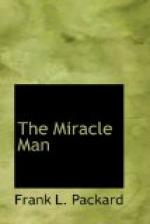Madison’s smile modestly disavowed any thanks, as he passed the slip to Mr. Higgins.
“Reckon that be it,” Mr. Higgins agreed. “An’ now, I guess I’ll go right back to town an’ write it—I allow that the sooner we get her down here the better. Folks’ll be glad to hear this—the women folks was figurin’ on takin’ spells an’ helpin’ out in the house same as the men in the garden—’pears now there won’t be no need of it.”
Madison accompanied Mr. Higgins outside and helped him to harness up.
“Look here, Mr. Madison,” said Hiram Higgins, as he made ready to go and climbed into the democrat, “would you allow that the Patriarch’s goin’ blind was goin’ to interfere any with his power of curin’ folks? It’ll be a powerful blow to the town if it does.”
“Why, of course not!” said Madison decisively. “Certainly not! Indeed, I wouldn’t be surprised if it enhanced his power—it’s purely mental, you know. They say that the loss of any one or more of the senses generally tends to make the others only the more acute—it’s the—er—law of compensation.”
“Glad to hear you say so,” said Mr. Higgins, with a sigh of relief, “’cause I got another letter to write ’sides this one for the Patriarch. It come last night, an’ I was figurin’ on speakin’ to you about it.” Mr. Higgins dropped the reins on the dashboard, and dove into first one pocket and then another. “Shucks!” said he disgustedly. “Now if I ain’t gone an’ left it to home after all. But I dunno as it makes much difference. It was from a fellow up your way by the name of Michael Coogan, an’ was addressed to the postmaster. ’Pears he read a piece in the papers about the Patriarch which he sent along with the letter. Allows he’s been ailin’ quite a spell, though he don’t say what’s the matter with him, an’ wants to know if what’s in that piece is all gospel truth, ’cause if ‘tis he’s comin’ down. That’s why I’m right glad to have heerd you say what you just said. Bein’ postmaster an’ writin’ ’fficially, I got to be conscientious and pretty partic’lar.”
“Yes, of course—naturally,” said Madison. “And what are you going to say to him?” “Why,” returned Mr. Higgins, “there ain’t no trouble about it now. Goin’ to tell him that if the Patriarch can’t help him there ain’t nobody on earth can—thought of mentionin’ your name, too.”
“By all means,” assented Madison cordially. “I feel like a new man since I’ve come here. I only wish more people knew about the Patriarch—it makes your heart ache to think of the suffering and sickness that people endure so hopelessly when there isn’t any need of it.”
“Yes, so it do,” said Mr. Higgins. He picked up the reins. “So it do,” he said heartily.
Madison watched the democrat as it started off behind the ambling horse—watched with a sort of fascination at the inebriate, sideways stagger of the wheels, a sort of wonder that the rear ones didn’t shut up like a jack-knife under the body of the vehicle and the democrat promptly sit down on its tail-board; then, smiling, he walked back into the cottage. The Patriarch was still sitting in the armchair beside the table. Madison halted before the other.




